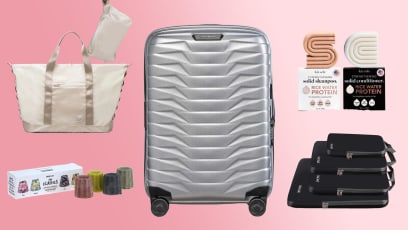Travel Insurance: To Buy Or Not To Buy?
Should you save on travel insurance to splurge on that Paris shopping spree?

According to a recent global study, travel insurance payouts in 2016 rose to US$54 billion (S$76bil) — up from US$38 billion in the previous year — due to an increase in natural disasters. Likewise, insurer AIG Singapore has also seen an 85 per cent increase in travel claims made for high-impact incidents compared to three years ago. So what gives? Do you live life on the edge on your travels (after all, isn’t that the spirit of wanderlust?) or be a little kiasu and buy travel insurance? Ignatius Chng, Vice President and Head of Group Personal Insurance at AIG Singapore sheds some light.
#1: Don’t skip on insurance even for short-haul flights
“There’s a common misconception that trips to nearby countries present fewer risks and inconveniences. However, risk exposure is the same regardless of the distance travelled — from cancelled flights to significant events such as natural disasters or medical emergencies. Even before you leave home for your overseas travel, unexpected events can happen such as your travel agent becoming insolvent. Hence, you should protect yourself from being caught unprepared, even on short trips to nearby destinations.”
#2: Globetrotters, think long-term
“If you’re a frequent traveller, you should consider buying an annual travel insurance plan, rather than a single trip policy. On top of being a more convenient and cheaper option in the long run, an annual plan also gives you peace of mind all year round that you’re covered, even for last-minute trips across the Causeway.”
#3: Travel and medical insurance are not the same thing
“Travel insurance protects customers against unexpected events when they’re overseas, such as accidental injuries and sickness as a result of travel. Hence, pre-existing medical conditions are generally not covered under travel insurance. Medical insurance, however, protects against medical conditions that customers may have, including pre-existing conditions. Check with your insurers if pre-existing conditions are covered under travel insurance prior to purchase.”
#4: Know what you’re entitled to
“Most travel insurance policies cover unforeseen events and unexpected financial expenses that might be incurred during your travel. These include medical expenses during and after your trip, emergency medical evacuation, lost or delayed baggage, trip cancellation, and interruption or delay, among others. Many travel insurance policies also protect buyers against travel agent insolvency — this means travellers can claim for the loss of irrecoverable travel deposits or travel fares paid in advance to the travel agent, in the event their trip is cancelled ’cos the travel agent’s [gone bust].”
#5: There’s no such thing as a one-size-fits-all travel insurance plan
“Choose the policy that best suits your needs and budget. For example, if your trip involves leisure skiing, you should ensure that the chosen policy covers this and that there is no exclusion for sporting activities. With the rise in high-impact incidents such as extreme weather events, medical outbreaks and socio-political volatility, you should also check that these are covered by your travel insurance policies. Premium policies might cost more, but they also offer greater overseas medical coverage and unlimited coverage for emergency medical evacuation. This ensures that policyholders do not incur out-of-pocket expenses in the event of serious illness or incidents abroad.”
#6: It’s not just about the money, money, money
“A common mistake people make when buying travel insurance is to opt for the cheapest option or wait for discounts before purchasing. But travellers need to ensure they’re adequately covered. Otherwise, even if you have travel insurance, you can still end up being out of pocket. For example, medical expenses incurred by travellers are often the costliest claims, sometimes running into hundreds of thousands of dollars. At the minimum, you should ensure that your travel policy provides comprehensive cover for unexpected mishaps that require medical attention. Look for a reputable insurer which provides 24-hour worldwide assistance, crisis response capabilities and the ability to process claims quickly.”
#7: Not all insurance policies are created equal
“The top emerging risks for local travellers over the next 12 months are high-impact incidents, such as extreme weather events, medical outbreaks and socio-political volatility, [so you want a plan that provides cover for these]. For example, [one of AIG Singapore’s plans] covers losses incurred as a result of an act of terrorism and includes accidental injury, follow-up treatment in Singapore, emergency medical evacuation, travel delay or damage to personal belongings.”


























